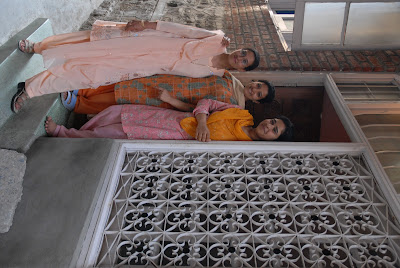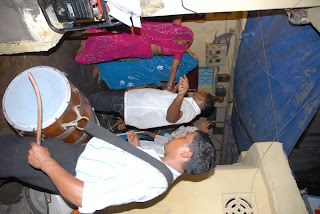
BANGKOK, Thailand - Ah, India. What a crazy experience. I have never before felt such a wide range of emotions crammed into such a short time period.
There is so much to love in India. So much to be entranced by and enthralled with. The Taj Mahal, the Rajasthani women standing in popping contrast to the desert sand, the vast array of religion, the chaotic yet langourous street life...
The challenge is you have to claw, grapple and push your way through so much shit, sometimes literally, to get to it. It's exhausting. I vascillated between completely loving it and completely hating it. India is just intense.

Traveling for five weeks in just two areas of the large country, I lost myself in India. But not in that I'm-a-new-person, enlightened kind of way. India seemed to bring out the worst in me.
Take my last bus ride early one morning from Jaipur to Agra, my last stop in the country. As the bus driver extorted 2 rupees from me for a "bag charge", I found myself hot with anger. Chest tight and jaw clenched, I jeered "this is bullshit." Sitting in my seat waiting to leave, I realized I had just cussed at an elderly driver over a whopping 6 cents.
It's not the money. It's the frustration of being constantly hasseled and hussled. So, instead of engaging, I just closed myself off, rudely dismissing eager shopkeepers, shooing child beggars and practically telling anyone who came near to shove it. Basically being a complete dickhead.
Then, I'd have a pleasant interaction with an Indian and feel bewildered and ashamed at my behavior, for acting like such a right shit. I would resolve to reclaim my usually approachable attitude, to smile and make eye contact and to start to let the world in again. After all, it's only as scary and nasty as I allow it to be.
I wouldn't take long, though, for someone to sniff the vulnerability of friendliness and swoop in to take advantage. And I'd be right back to marching through India with my try-me-I-dare-you stare, pursed face and generally pissed off attitude.
I hate acting that way. I don't like being dismissive. I don't like ignoring people. I'm a journalist for Christ's sake! That, I think, was the source of my displeasure in India. I couldn't be the best version of myself.

The trip also revealed an unpleasant truth about myself - and one I'm afraid others who know me have always readily seen. It's no secret that I'm spoiled. My wonderful and generous father never let his kids want for anything (except a horse and trampoline). And in the corporate excess of the 1980s I aquired sun burns at resorts all over the country - Tuscon, Orlando, Palm Springs - as we often accompained my father on lavish business trips. I learned the joy of charging it to the room and non-alcoholic pina colodas with those little umbrellas.
So spoiled, yes. Accostomed to the priveleged life, yes. But I didn't realize until my experience in India just how much I would cling to those luxuries when I was stressed out. About three weeks into the trip, my second round in Delhi again hit me like a sledgehammer, knocking my legs out from under me just when I was getting comfortable.

A friend, bless his soul, came to the rescue with an offer to stay with him at a 5-star hotel on the government's dime. I retreated to the calm serenity to lick my wounds...at the pool with a fluffy white robe. (In my defense, I was going on day 8 of pink eye and was having a nasty allergic reaction to the meds I got in Dharamsala. I needed that on-call hotel doc).
I've reported from Iraq, gone on house raids with the US Army in Ramadi. And I was fine. Kicked butt and took names, actually (well, at least in the I-wrote-everything-down and reported-it sort of way that we journalists do). So I was surprised I could be overwhelmed.

I don't know if it was the squalour, the lack of personal space, the aggression of the Indian people or just the feeling of being such a fish out of water. But something got to me.
I found it incredibly difficult to connect with the people in any meaningful way. Indians always want something from you. Rare is the conversation that doesn't have an end game. Enevitably the sales pitch always comes.
In Udaipur I hung out with an Isreali women named Tal. She and I have similar feelings about India - at its worst it's in-your-face, overbearing and often disrespectful. We had an interesting conversation about trying to understand the culture rather than retreating in our first impressions and isolating ourselves.
Tal told me a story about living in the States and being constantly annoyed at how people, such as a salesperson at a store, would ask how she was after saying hello and then fail to listen to her earnest answer.
I had to laugh. In that kind of situation Americans don't ask the question to ascertain an answer; it's simply an extension of the greeting, an acknowledgement of the person's presence and a welcome. When Tal would answer beyond the usual "good" or "fine" expected, she was off script.
I started to wonder how I was off script in India. Surely there was some logic in what I perceived as utter chaos. When I felt invaded and violated by the constant intrusion into my personal space, the Indians must be operating within their acceptable boundaries and perceptions.

Like when I would be pestered to death at a coffee shop just trying to read the paper in the mornings. In Indian culture, if you are sitting by yourself than you must be in want of company. No one wants to be alone! So they would join me and want to chat endlessly (it was the one time they didn't want to sell me something, as I was already in their establishment).
I never found the answers. I'm far from having figured out the puzzle of Indian culture. Still, as I look back I realize I had some great encounters. Like in Kashmir when I spent a delightful hour sitting on the floor eating cake and drinking tea with a local family who had been kind enough to invite me into their home.
My last afternoon in India, I couldn't help being anything but engaged by the life around me. On a dusty street, teenaged boys were playing a rowdy pickup game of cricket, watched by a couple of bored-looking donkeys. They were interupted by the occassional speeding motorcycle and once by a herd of cows with bells around their necks. To the left a monkey, who had been scampering along the store signs, wickedly jumped onto a tin awning, bounced up and down and delighted in the racket he made.

This country is never dull, I'll give it that. The senses are always atwitter here. Although I find the country intrusive and confrontational, I do get a kick out of the street life - at least when I'm not cursing it.
In the hours before my flight to Bangkok part of me was blissful at the thought of leaving India behind and moving onto the laid back friendliness of the Thais. But the dogmatic, determined, competitive side wasn't ready to go, not in defeat. India is a challenge and I wanted to tackle it, wrestle it to the ground and conquer it. Alas, I didn't have the time or the energy. That will have to wait until my next trip to the bewildering Asian subcontinent (and, yes, there will be one).

I leave the topic of India behind, dear readers, with my Top 10 LOVE/HATE list of India. For those who have been, feel free to add your own to the comments
LOVE
1. Strangers inviting you into their home
2. Chicken tikka, banana lassi and nan
3. The bright, colorful dress of the women
4. When shopkeepers, upon seeing you with your backpack, step out of their store to wish you a good journey - even those to whom in maddening frustration you were positively rude
5. The formal Queen's English, like when they address you as "madam" and ask you about your "motherland"
6. The shopkeepers insisting their customers sit, chat and drink chai with them
7. India's acceptance of outsiders into their country for refuge
8. The Tibetan prayer flags at McGleod Ganj
9. Fervent political debates on late-night trains
10. Never knowing what's going to happen next
HATE
1. Needing exact change for everything
2. The scarcity and high cost of Diet Coke
3. The subjugation of women
4. Rickshaw drivers who try to misguide you, ignore your requested destination and take you to a place where they get a commission
5. Aggressive salespeople who don't take no for an answer and follow you for blocks
6. The shopkeepers insisting their customers sit, chat and drink chai with them
7. Indian men who sleazily leer, "accidentally" bump into you or blatantly cop a feel
8. The cow shit
9. The loud, disgusting phlem hawking, and the very public penis holding and ass scratching
10. The obnoxious price inflation for foreigners


















































